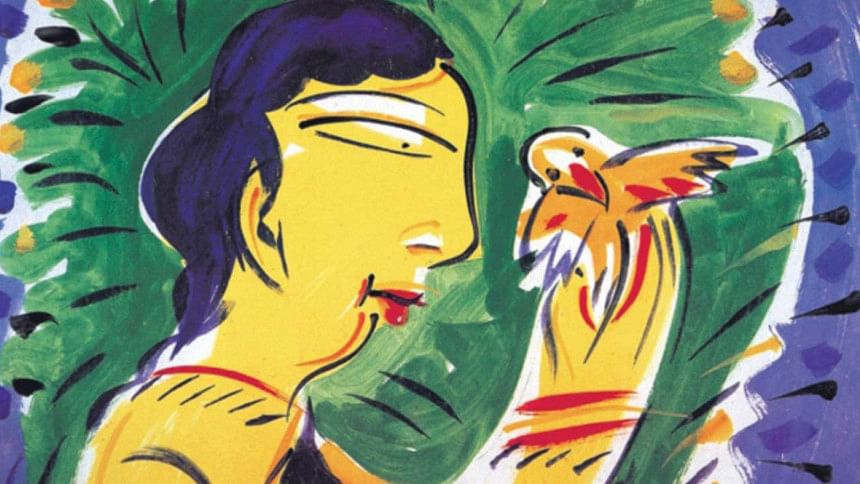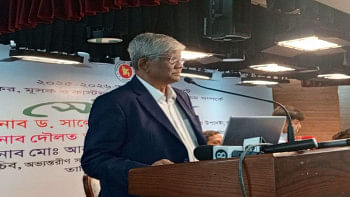Wise words

Rajai rajai juddho korey, ulukhagrar pran jai.
If you are a Bangladeshi, you've heard this adage before. While it may sound complicated, (a bit of a tongue twister, really) the meaning of this proverb is very simple and aptly topical. Meaning “ordinary folks suffer when powerful rivals fight each other.” It is an age-old maxim that could easily be applied in today's world.
Bachans or proverbs are some of the earliest genres of folk creativity in this region. Of particular import are the bachans of the legendary poet, astrologer and soothsayer Khona who composed her sayings and poetry in the medieval Bangla language between the 9th and 12th centuries AD. The legend goes that Khona's father-in-law (some argue that it was her husband), who himself was a great astrologer, had her tongue cut when he realised that Khona's prophecies were more accurate than his ones. Despite his attempts to subdue her voice, Khona's sayings and adages have survived the passage of time, reaching people from all around the subcontinent, including Nepal, Bihar, Orissa, West Bengal, Tripura, Sri Lanka, South India and Gujrat.
As we celebrate Pahela Baishakh all over the country today, it is interesting to recall that the development of the Bangla calendar was initially planned for relatively easier tax collection that could coincide with harvest seasons, making it easier for farmers to pay their taxes on time. Incidentally, a significant portion of Khona's bachans are related to agriculture and livestock rearing. While at first reading, these sayings might seem to be directed only toward farmers, her bachans that are laden with meaning are applicable for every person from every generation.
Chinish ban a chinish, khuje dekhe goru kinish.
This adage, for example, gives a fair warning to farmers to be careful when buying their livestock, to check the animal's pedigree and actual worth instead of purchasing it simply on the basis of superficial appearance. This wise saying is also applicable to our lives, as Khona implies that one should be careful in choosing anything and not be swayed solely by appearances.
She emphasised on the need to allocate the right person for the right job:
Gai diye bai hal, dukkho tar chiro kaal.
Khona suggests that if the farmer uses his cow to till his lands, instead of his bullock, he's bound to end up with poor crops. Similarly, when you appoint a person who is unsuitable for the job then you can't really complain about the end results.
Khona's sayings are not simply wise proverbs but provide a peek into the lives of people who lived ages ago. As her bachans often focused on agriculture and dairy farming, we understand that both were considered to be important professions of that era. Her bachans are still diligently followed by farmers in rural areas. She had spoken about the importance of bamboo in the daily lives of farmers, and even today, residents of rural areas follow her instructions in the plantation and use of plants like bamboo.
Khona was probably one of the first people to understand the importance and effect of weather on crops. She wrote that when's there's a lot of thunder, there's usually no rain. She also drew parallel conclusions between the production of certain fruits and possible future weather events. If in one year there is a bumper crop of mangoes, tamarind and jackfruit, she says, there's a chance of possible floods that year. Furthermore, she would observe the activities of insects and animals in predicting weather patterns. You might have heard of the saying that when a frog uncharacteristically calls loudly, there is a strong possibility of rain. Even at that age, Khona based her predictions on nature and science instead of going by heresy and myths.
Farmers all over the country, particularly Comilla, Mymensingh and Dinajpur still follow her instructions regarding when to plant paddy, and how much water should be used. In one of her sayings, Khona argues that rain in the month of Aghrayan is terrible for crops, thus leading to a possibility of famine. While keeping with the mindset of people in that era, Khona phrases her sayings in relatable couplets that don't disguise her observational skills that she used in her “predictions.”
The writer is a Journalist at The Daily Star.

 For all latest news, follow The Daily Star's Google News channel.
For all latest news, follow The Daily Star's Google News channel. 



Comments